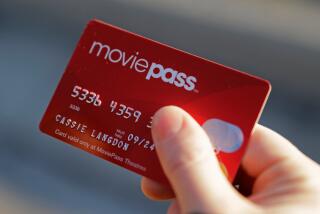Buyout Firms Weigh Salvaging Theater Bet
- Share via
DALLAS — Hicks Muse Tate & Furst Inc. and Kohlberg Kravis Roberts Inc. are discussing whether to cut their losses on a $1-billion bet on Regal Cinemas Inc. or up the ante by buying the theater chain’s troubled rivals.
With Regal bonds selling for 12 cents on the dollar and lenders pushing to get repaid, Hicks Muse co-founder Thomas Hicks said the two buyout firms, among the world’s biggest, have deep enough pockets to help revive the business. Five theater chains have filed for bankruptcy protection in the last 13 months, and Regal has asked its bankers to ease terms on debt payments.
“We will be involved in the process actively and we will make a decision as it unfolds,” Hicks said in an interview. KKR and Hicks Muse are “fortunate enough to have the resources to lead” the restructuring of the industry.
Investing in an industry shortly before its sudden collapse marks a rare stumble by the buyout specialists. It will trim returns and could make it tougher as they try to raise record sums. KKR is seeking up to $10 billion, and Hicks Muse is trying to assemble a pool of as much as $5 billion.
Buyout firms use borrowed money to acquire troubled companies they hope to turn around, as KKR did with Borden Inc. They also collect and resell fast-growing businesses in an industry, as Hicks Muse did with radio stations. Buyout firms’ average annual returns of 20% the last 20 years have attracted increased interest and more competition for the best investments.
In 1998, Hicks Muse and KKR bought Regal Cinemas, the nation’s biggest theater chain, for $500 million each, borrowing $1.2 billion from a group led by Bank of America Corp. They aimed to own one in four of the nation’s movie screens.
After the purchase, Regal and its competitors went on a building spree, putting up mega-plexes with stadium seating and amenities such as cup holders. The expansion left too many chairs unfilled and too much debt to repay.
Regal spent $427 million last year to add 869 screens, giving it about 4,500. It has $1.9 billion worth of debt and expects to report earnings of less than $30 million in its third quarter before interest, taxes, depreciation and amortization, a decline of as much as 30% from last year’s $34 million.
From 1990 to 1998, the number of screens exploded by more than 10,000, or 46%, while the number of tickets rose 25%. ING Barings projects 39,400 screens will be showing movies by year’s end. That could be the peak.
“We’re going to go through an industrywide restructuring, a lot of bankruptcies,” Hicks said, predicting that many theaters will close in the next 12 to 18 months. “At the end, there will be half the number of companies.”
In July, Standard & Poor’s lowered Regal’s bank debt to one of its lowest junk grades and its subordinated debt to double C.
“Regal files for bankruptcy before the first of the year. I just don’t see any other way around it,” said John Helms, a debt analyst at Tejas Securities in Austin, Texas.
Regal is in better shape than others. WestStar Cinemas Inc., Silver Cinemas International Inc., Carmike Cinemas Inc., Edwards Theater Circuit Inc. and United Artists Theater Co. already have filed for bankruptcy.
At least one investor, Denver billionaire Philip Anschutz, the biggest shareholder of Qwest Communications Corp. and the owner of the Los Angeles Kings hockey team, is stepping up. He’ll own 55% of United Artists’ shares when it emerges from bankruptcy reorganization.
KKR and Hicks Muse were just two of the buyout firms that have lost big in the theater business. Merrill Lynch & Co., Beacon Group and Brentwood Associates have all had losses. Goldman Sachs Group Inc., which owns 4.5% of Carmike, has seen the value of its investment plunge 94% in the last 12 months.
Christopher Ailman, chief investment officer for the Washington State Investment Board, a KKR investor, called the Regal Cinemas investment “somewhat impaired.”
“It probably will be written down in the next three to four months so the numbers won’t look as good,” Ailman said last month before the fund approved a $1.5-billion investment for KKR.
More to Read
Inside the business of entertainment
The Wide Shot brings you news, analysis and insights on everything from streaming wars to production — and what it all means for the future.
You may occasionally receive promotional content from the Los Angeles Times.










